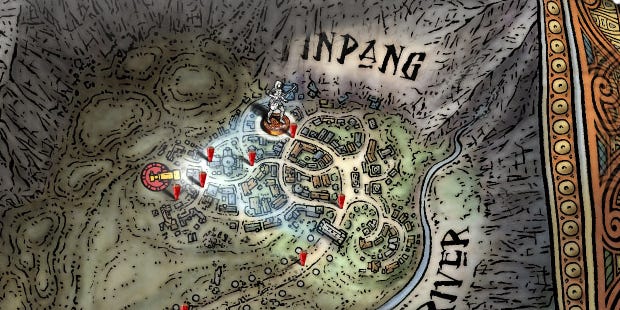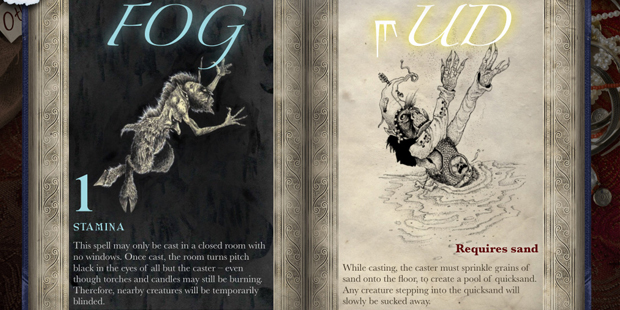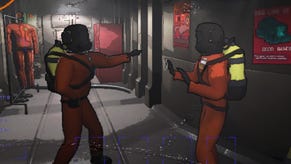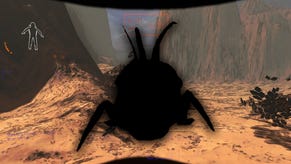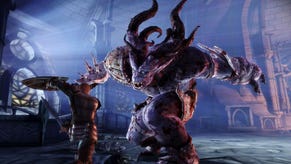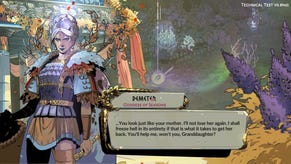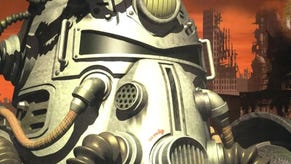The RPG Scrollbars: Inkle Studios On Sorcery!
Izzy wizzy, let's get XYZZY
Inkle Studios' Sorcery! [official site] has been one of the biggest surprises to hit the iPad in recent years, not simply converting the old Steve Jackson gamebooks like most companies working in the field would have done, but completely redesigning them for the modern era. Finally, they're on their way to PC - the first two very, very soon, the second two later this year. I had a chat with studio founders Jon Ingold and Joseph Humfrey about turning a very 80s series into a shockingly modern adventure.
RPS: So, Sorcery's come on quite a way since it was trapped between covers. Just how much more is there in the games than the original books now?
Jon Ingold: For people who've read the books, it's kind of insane. With the first Sorcery we were worried about making sure that core fan-base was happy and that we didn't mess with anyone's nostalgia. We added a bit here and there and made it a bit more interactive, so for instance in the book you'd go into a tavern and that would be a page of text. We'd break that into a scene where you chose every line of dialogue and decision to work through it. That was the principle - we want interactive fiction where you work through the scene and making interesting choices.
But we found that everybody liked that so much that for 2 we added a fair bit more, and then for 3 we added a whole other world that doesn't exist in the text. By 4, which we're just finishing up the writing on, I think... for 4 I have a co-writer who's been helping adapt the book, so I've written about as much text as I ever have and I haven't opened the book once. It's really turned into its own thing. We tend to measure this with wordcount, and that's an okay metric - the first book is about 60,000 words, the first game is about 150,000. Sorcery 2 is about the same for the book, but the game's about 350,000... something like that.
At this point, I interrupt just to explain some of the complexities. Sorcery 2 takes place in Khare, Cityport of Traps, where you have to navigate street after street of absolute sociopaths, villagers happy to betray you, evil nobles, and the first waves of an all-out invasion that frankly it has coming to it. Reach the end though and the whole thing becomes a time loop for better going back and dealing with old business - one that's actually worked into the story and interactions instead of just being a save state.
Sorcery 3 completely explodes the gamebook style into an open world where you can more or less go wherever you want whenever you want on an open-ended quest to defeat seven mighty serpents however you can. And normally that would be The Big Impressive Thing. But it's not. Instead, that honour goes to the time travel mechanic. Across the map are several lighthouses, shining a light into the past. Need to cross a broken bridge? Turn on the lighthouse and it'll be whole again. Here's the really clever thing. You can turn the beams to manipulate time across most of the world... at will. This is not your father's Sorcery. Or, if you were around in the 80s, yours.
Joseph Humfrey: All these things are so difficult to quantify though. In branching narrative... well, most people don't really know what 50,000 words 'is' unless they happen to be a writer. Then when you talk about interactive content... how much will you read? You might end up seeing most of the content if we enable that type of exploration, or just bits of it.
JI: There's really nothing stopping me putting the Crown of Kings in the first room and then that's it, unless you choose to go explore the land!
JH: Another metric we use is the number of choices, but... 10,000 choices? What does that mean either?
JI: I think the only way to talk sensibly about it is the number of encounters. For Sorcery! we kept the basic number from the book. Come Sorcery 2 there's about twice as many as the book. Luckily the more we developed the more we realised the fans like what we're doing, and the people who don't remember the books also seem to like what we're doing, and Steve likes what we're doing. So that's a good position to be in. We've got the ability to turn the world inside out, twist it, and take a certain delight in taking what the original game book did and trapping anyone who just tries doing now what they did back then.
RPS: Yeah, the classic conversion joy, from the Lord of the Rings RPG onwards. No, no, that's not going to work this time!
JI: And with all that, what we've really been enjoying is trying to... not really modernise it, but spin it a bit. The original books are very 80s, very D&D.
RPS: Yeah, this was the problem I had with the very first Sorcery - it feels like a product of its time, from the instant deaths to generally shallow fiction, especially compared to the later games.
JH: As designers, we're incredibly restless. We like trying new ideas, and in a way Sorcery has turned into our prototype testing pot for new concepts. As soon as we realised that Steve and the fans are happy for us to take it to new places, it's been really fun to build on things. Then, us as designers, we come from different directions. Jon grew up with text adventures, Sorcery, etc. My admission is I never played it as a kid! So what I was trying to do with the first one was make sure it would be fun to newcomers and be a fun game.
JI: And appealing, of course, not just leaning on nostalgia. To make it something crafted and new that people would want to play. For me, there's also that we've been learning the tools over time. When we made Sorcery it was the most ambitious project we'd ever done. When you hit Sorcery 3 where the map is remixing itself at the player's command... that's a horrifically difficult bit of scripting that I just couldn't have done straight off the bat.
JH: It's been really fun discovering this technology that's been consistent between the games. There's not that much technology that can persist and last this long.
JI: Sorcery 1 is not a very emotional game, in that there's a lot of encounters but few have any real heart and soul. But you get to 3, partially from the influence of having worked with Meg Jayanth on 80 Days, there's a lot of people you meet who are nice or in trouble or just generally have a bit more soul.
JH: People who are NICE? (Laughs) We used to argue about this - like how in Sorcery 1 you'll walk into a room and someone will go "Can I help you?" and you walk over and they hit you on the head and steal your stuff! That's Sorcery!
RPS: I was fascinated by how Sorcery 2 embraced one of the most unpleasant places in gamebook design - Khare, a city of thieves and arrogant nobles and sociopaths. Welcome to the new world of interactive fiction! Your grave has been prepared... To quickly preface this by saying I really liked Sorcery 2, it is pretty much The List of things that you Don't Do In Interactive Fiction - surprise deaths, endless bullshit traps, false promises of reward, etc. It was so strange to see a game openly subverting that, and giving you the chance to do the same by just marching on through and going "Fuck this place, I hope it burns."
JI: I think we have to preface the answer by saying that we have a rewind mechanic, and if we didn't have a rewind mechanic then we wouldn't do that stuff. Having it though suddenly gives us this immense freedom to be cruel-
JH: Of course it's still toned down from the original book. You die and turn back a few pages like you'd got your fingers in the page. We do that, but we don't have as many absolute deaths.
JI: Yeah, and it's not quite that you're killed by decisions, more... slightly humiliated? Someone will throw you in a sewer or steal the stuff you just got or whatever, and it's that gentle needling that goes "Aw, you thought you were doing well? No, you're not." The goal for me was to put the player into a kind of interactive theatre where the world is constantly talking back, because otherwise you're a player and you just wallop it being a god. And that's... not very entertaining? Sorcery 2 doesn't take your progress from you, doesn't do you any harm, but it tries to surprise you with all the ways the world can screw you over. And if you want to have that playthrough where you just take it... that's narratively satisfying.
RPS: Yeah, I had a similar idea behind some of the bits that I wrote in Failbetter's Sunless Sea... trying to split the character and player a little so that they become a stooge in a way that the player laughs at rather than feels personally attacked by. Having their clothes stolen by a mischievous child and so having this embarrassing naked run through the jungle, waking up with an obscene tattoo after a night's drinking and so on, with the idea that it's happening to a character you feel something for, but are still removed from enough to laugh at.
JI: Definitely the player needs to be given the chance to make an interesting story instead of just Winning. But there are players who just want to do that...
JH: It seems strange to me, why players really enjoy the games we make if they're just into the min-max experience.
RPS: Especially since you won't know if you've done it for another few years!
JH: Yeah. But it happens. 1/1000 players will write to us and say "I played 80 Days, I completed it in 45 days, wasn't hard." And... I don't want to say you're missing the point, play it how you like, but...
RPS: Yeah. I always felt the fundamental problem with 80 Days is that it encourages you to rush, to the point I always told people to just blitz it on that first go and then forget the timer even exists and just go see what else is out there.
JH: I completely agree - but even just testing it, I can't get over the urge to do it.
JI: What 80 Days does to get around that is that it starts you off in a huge rush, but then in the middle of the game you go "Oh, I've got LOADS of time!" Then you make a deliberate decision to ignore Fogg because you know you've got time, and then that screws you. If the player doesn't do that... we could knock them off course or something, but that'd be frustrating. Hopefully it's a game that encourages you to do the wrong thing, but by making the 'bad' choices look interesting enough to sacrifice time or the mission.
RPS: As these games get more complicated, are you finding players still able to keep track of them? That's been a bit of an issue for interactive fiction in general for a while - the mental maps, holding images and goals as well as details in mind.
JH: One of the things with Sorcery is that it tries to be a casual experience... if you want it to be. Want to find every serpent? Close every quest? Min-max it? There's a huge amount to manage and strategise over. We had a forum on Touch Arcade for instance which wanted to kill every Serpent - the bosses of the game - without using any time beacons. And they did it. We suspected it was possible, but hadn't actually worked out how it could be done. And now the plot of 4 has to compensate for the fact that some players have done that. But if you don't want to do that, you can basically bumble your way to the end pretty easily. What we hope is that those players will do though is get to the end and then go and have a better look. We almost want to hit people with so much content that they give up on the idea of min-maxing in the first place and just act like an adventurer, because that's far more fun to do.
JI: If you can get everything in your head, it loses its magic a bit. Maybe.
RPS: So how are these things structured, on a design level? I can't imagine the plan for Sorcery 3, with its multiple timelines and open world.
JI: Mostly it's individual encounters that we juggle and reshuffle. Meg's advice during 80 Days was... any idea you have, write it. You can't throw anything away. And that's really applied to 3 and 4. Through a lot of playtesting and iteration, we assemble it.
JH: With Sorcery we'd start with the original gamebooks and just expand out. With 80 Days we had these nice black boxes to fill with content - the cities.
JI: We basically used the distance from London as a stress meter. If you're in New York, it should be exciting. If you're in Belgium, not so much. I think Sorcery does that too. But then it got crazily complex. The basic quick encounters are the same as they've ever been, but then on the top of that there's this map superstructure that... well, it's a nightmare, but it makes those simple encounters feel more complex.
RPS: I think something that fascinates me about storylet driven games is that they feel like the best of both worlds in many ways - crafted experiences, but also freedom. It seems something of an indie secret at the moment though. Do you see it being picked up by larger devs?
JI: Definitely. I mean, if you look at a normal open world game like Assassin's Creed or The Witcher or whatever, you have two or three mechanics... combat, card games, whatever... and lots of dialogue. What we do is exactly the same structure, except that every encounter is entirely unique. From a content point of view, that's much richer, much better, more wonderful emergent experience... just with lower production values. I'd always take something more bespoke, something with more agency, something less looped.
JH: The big challenge is translating this flexible text-based script that has bespoke content and... you can't do the same thing with pre-recorded audio and animation with the same budget.
JI: But when we did Sorcery 1, gamebook people were telling us, you can't have as much choice as this because you'll get combinatorial explosion. And we said, no, you can manage that. Macro choices, micro choices, callbacks... you can work around it. I think we've proved now that you can create an unbelievably complicated game in six months with four people. You can do that. It's not impossible. So, if we were to walk into Sony HQ and say we wanted to create this open world in the same style, they'd tell us, no, it couldn't be done. In reality, there would be something. We'd never make The Witcher 3 with Sorcery's dialogue trees, but somewhere in there there is a way.
JH: Game by game, they're moving closer to it, and that's incredibly exiting.
And the next game... which still doesn't have a name... is another step up on what we've done previously. It's starting to tackle some of those questions and may even leave itself open to translations and audio and other things that are completely impossible right now. Of course, there's lots of problems to tackle first. Our approach as a company, obviously really, has been to iterate. Our next one will be another leap... but not TOO big a leap. It's exciting. It's interesting. But there's always new problems.
Sorcery! 1 and 2 are out soon on PC, with the other two parts following this year.
